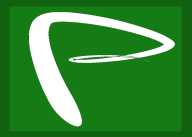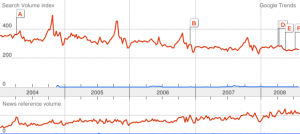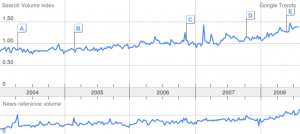I have come to a shocking realization:
Walt Disney World for Grownups is a Page Rank 0 Site.
Because of the mystery surrounding Pagerank and particularly the dreaded PR0, it took me a while to come to this conclusion. I initially thought I was just waiting for my first Pagerank update and then we would see our initial Pagerank. However I am getting a different response than the “N/A” that I got when the site wasn’t ranked in the database. I’m getting a 0.
So of course in a panic I began a frenzied session of research. How can I fix this? What does this mean? What will happen? This is where the intentionally vague nature of Google’s Pagerank and the twisted landscape it has created became clear. Separating myth from logical conclusion from fact is nearly impossible.
In a perfect world, Google would say “Don’t worry about your Pagerank”, everyone would say “OK,” and we’d move on. Unfortunately, in this world, people create hypotheses, test them, and post their results. Other people just create hypotheses and post them as facts. All of these hypotheses get mixed together and relentlessly presented as fact, eventually making it nearly impossible to identify reliable information. Here are some conclusions I have drawn based on my research, in order of confidence. Be aware NONE OF THESE ARE KNOWN FACTS.
Fairly Confident: Pagerank Zero is not the same as Banned
I feel fairly confident that this is true, although considerable documentation will lead you to believe otherwise. The easiest way to verify this is the fact that a Google search for our site returns results. Also using Google’s Webmaster Tools I can see that we rank highly for a few searches. So it seems that we exist in the database and can receive searches. We also of course have a few search hits from Google that also corroborate this.
Somewhat Confident: “Badrank” is real
Walt Disney World For Grownups has several decent inbound links. In the same timespan Protoscopic has a PR of 2 and WDWForGrownups has a PR of 0.
Neither site is conducting any type of “shenanigans;” the only difference I can come up with is that WDWForGrownups has many outbound links, some to PR0 sites. While I wouldn’t think this would be a big deal, this site, which I have always found to be very reliable, mentions a Google employee who warns webmasters not to “Link to bad neighborhoods.” This supports the idea that sites are given a “Badrank” penalty whenever they link to other PR0 sites.
It may be at the time the last database was generated, WDWForGrownups had few inbound links and several outbound links to PR0 sites which penalized us sufficiently to get us down to a PR of 0. While I don’t really think this is a good policy, it at least seems plausible, is supported by knowledgeable experts, and seems to be supported by evidence. I can’t really think of anything else that would influence our ranking negatively, so I’m hoping that the next update will show our link-building efforts have counteracted our “Badrank.” I am not really sure why some of the sites we link to have PRs of 0 but they have excellent content that we are loathe to drop just to improve our Pagerank.
Somewhat Confident: Pagerank Zero is not a Death Sentence
As mentioned before, we rank fairly highly for some searches. So obviously it is possible to overcome a Pagerank zero. Additionally we know of sites that are “leaders” in our sector that also have a Pagerank of zero. This leads me to believe that it is at least possible to operate successfully with a zero page rank. In the long run, however, we don’t want to test this hypothesis empirically.
In the end, the only things I am confident of are that PR is not as important as I thought and that there is a lot of bad information out there. I saw many forum threads in which someone stated something authoritatively, was refuted, and then said “well it sure seems that way to me.” So plenty of people want to act as authorities when they are not. We will continue to try to sort out this information and try to continue to improve our “working understanding” of the mysteries of Pagerank.





